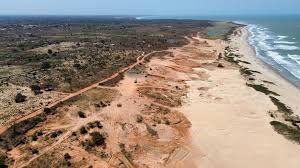By Nelson Manneh
The Gambia Environmental Alliance (GEA) has issued a strong condemnation of the ongoing destructive sand mining activities along the country’s coastline, calling for an immediate halt to the operations, accountability for those responsible, and full restoration of the damaged ecosystems.
The GEA’s reaction follows a recent investigative report published by the Republic’s media outlet titled “The Opaque Mining Deal Gambling with Gambia’s Future.” The report exposes a web of corruption, environmental degradation, and governance failures surrounding sand mining in the country’s coastal villages.
“The revelations highlight how GACH Mining Company and other politically connected firms have continued destructive sand mining operations in Tujereng, Sanyang, Kartong, Batokunku, and Brufut, despite clear regulatory violations, expired licenses, and overwhelming environmental and economic damage, particularly to women farmers,” GEA stated.
In a press release, the Alliance described the situation as a damning indictment of The Gambia’s environmental governance. It cited serious concerns, including the awarding of mining contracts without public tender, flouting of procurement and environmental laws, and the government’s failure to implement recommendations from the Janneh Commission, which had urged a halt to all mining until proper rehabilitation and restoration were completed.
The GEA further criticised the National Environment Agency (NEA) for failing in its regulatory duties. “The NEA has failed in its watchdog role, issuing approvals retroactively or overlooking lapses entirely,” the statement read.
Of particular concern is the government’s purported 60% profit share in the mining operations, despite having no independent records of exports or earnings, instead relying on unverified data provided by GACH. The result, GEA said, is devastating: local communities, especially women, have seen up to 70% of their household income wiped out due to the destruction of rice fields and vegetable gardens.
“These are not just administrative lapses; they are acts of environmental injustice and economic sabotage. The coastlines are being plundered, ecosystems razed, and livelihoods shattered, while the public is kept in the dark,” GEA emphasised.
In response, GEA is demanding a series of urgent actions: an immediate national moratorium on all coastal sand and mineral mining operations; independent environmental audits of all affected sites with full community participation; a legislative inquiry into the licensing processes and regulatory failures; public disclosure of all mining contracts, Environmental Impact Assessment (EIA) reports, and company financial records in line with the Access to Information Act; reparations and restoration for affected communities, especially women subsistence farmers; and prosecution of any public officials or private companies found to have breached environmental or procurement laws.
GEA affirmed its solidarity with the impacted communities and announced plans to mobilise civil society organisations, youth groups, and legal advocates to demand justice. “We call on the Government, the National Assembly, and development partners to act before it is too late,” the statement concluded.


















